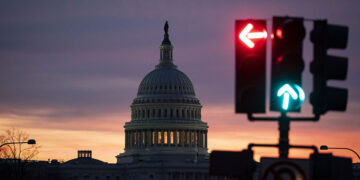Military Attacks on Yemen Breach Constitutional and International Law Requirements for War, Threaten Peace and Stability in Region
(Washington D.C., January 18, 2024) – The Biden Administration should end its military strikes on Yemen, which violate the requirements of the U.S. Constitution and Article 7 of the United Nations Charter for commencing war, said Democracy for the Arab World Now (DAWN) today.
The administration also should reverse its designation of the Houthis as a terrorist group, subjecting the country to sanctions that will harm civilians.
"The Biden administration is launching a war on Yemen without congressional approval, as our Constitution requires, and without meeting the most basic international law requirements for military action – the very same conduct for which it criticized past administrations," said Sarah Leah Whitson, DAWN's Executive Director. "Biden is not only harming U.S. interests by expanding war in the region to defend commercial interests, he is undermining the black letter rules of our very own Constitution and the U.N. Charter."
On January 11, the White House released a statement announcing that U.S. military forces had conducted several strikes against targets in Yemen, together with the United Kingdom, Australia, Bahrain, Canada, and the Netherlands. It justified the strikes as a direct response to "unprecedented Houthi attacks against international maritime vessels in the Red Sea." According to the U.S. Air Forces, the U.S.-led coalition struck over 60 targets with over 100 precision-guided munitions. In response to the airstrikes, the Houthi group's Supreme Political Council announced that "all American-British interests have become legitimate targets for the Yemeni armed forces." On January 12, the U.S. Department of State announced that the U.S. has sanctioned two companies and blocked four vessels for shipping Iranian commodities to the Houthis.
On January 17, the Biden administration also announced that it was reinstating the designation of the Houthis as a "Specially Designated Global Terrorist Group," pursuant to Executive Order 13224, which allows the U.S. government to sanction Houthi assets. Such sanctions unavoidably disrupt commercial transactions and supply chains for essential goods, and primarily harm civilians.
"The Biden administration is reinstating some of the very same sanctions that it condemned Trump for imposing on the Houthis because of the inevitable harm to Yemeni civilians they will cause, and no amount of tweaking will protect against that," said Raed Jarrar, DAWN's Advocacy Director. "This administration seems as addicted to imposing sanctions on foreign countries as the Trump administration was, and failing to follow its own directives tying such sanctions to a clear policy objective and minimizing civilian harm."
The Houthi armed group, also known as Ansar Allah, has carried out over two dozen attacks with drones, missiles, and boats against commercial vessels in the Red Sea.It has claimed the ships were linked to Israel, including a British-owned cargo ship and its crew, which it has seized since November 29, 2023. The group has announced that it will continue to target "Israeli ships" or those heading to or originating from Israel until Israel ends its war in Gaza; the International Court of Justice is currently hearing a case alleging Israel is committing genocide in Gaza. The group has also declared that it is committed to maintaining shipping trade in the Red Sea for all other ships and to all other destinations. However, at least some of the ships it has attacked appear to have no connection to Israel.
On January 10, 2024, in response to the Houthi shipping attacks, the UN Security Council adopted Resolution 2722 (2024) demanding that the Houthis immediately cease all attacks on merchant and commercial vessels but also urging "caution and restraint to avoid further escalation" and "encouraging enhanced diplomatic efforts by all parties to that end, including continued support for dialogue and Yemen's peace process." The resolution came a day after U.S. and British naval forces shot down 21 Houthi drones and missiles in the Red Sea, which they claimed were targeting American ships. The Houthis claimed that their attack was partly in retaliation for a December 31 U.S. attack that sank three of its boats and killed its fighters.
"The Biden Administration's policies in the Middle East – including this reckless, unlawful, newly launched war on Yemen and the reinstatement of sanctions that it knows will harm Yemeni civilians – will harm U.S. interests by escalating the conflict in the region far more than they will help," said Sevag Kechichian, Senior Researcher with DAWN. "America's reputation and credibility in the region have never been this low, and will never recover unless the Biden administration immediately reverses course."
The U.S. and U.K. attacks on Yemen undermine U.S. interests in peace and security by expanding the fighting tied to the conflict in Gaza to the region. A bipartisan group of US lawmakers criticized President Biden's authorization of the airstrikes without congressional approval as unconstitutional. Article I, Section 8, of the Constitution states that only Congress has the authority to declare war, and Section 10 explicitly requires congressional approval for military action. Section 1541(c) of the War Powers Resolution (50 U.S.C. §§ 1541-1550) further stipulates that the President, as Commander-in-Chief, cannot unilaterally authorize any offensive military action, but can carry out a defensive military action without Congressional approval only to repel sudden or ongoing attacks directly on the U.S. or its possessions. While the White House statement described the airstrikes as a "defensive action," the unauthorized airstrikes clearly fail to meet the exceptional qualifications of a direct attack on the U.S..
President Biden had previously criticized former President Donald Trump for authorizing U.S. military airstrikes without congressional approval and pledged to use military force responsibly. In January 2020, he wrote that "A president should never take this nation to war without the informed consent of the American people," in response to then President Trump's authorization of the assassination of Iran's Revolutionary Guard leader Qassem Soleimani in Iraq. In February of the same year, the then presidential candidate Biden tweeted that "As President, I will use military power responsibly and as a last resort, we will not go back to forever wars in the Middle East."
The U.S. airstrikes on Houthi targets in Yemen also violate international law. Chapter VII of the United Nations Charter prohibits the use of force except if authorized by the UN Security Council or in immediate self-defense against an attack by another country. The Biden Administration has not sought Security Council authorization for its airstrikes. Customary international law also requires military force to be used as a last resort.
The Biden Administration had revoked the U.S. "Terrorist" designation of the Houthis in February 2021, citing warnings from the UN, U.S. Congress, and humanitarian groups on the designation's "devastating impact on Yemen's access to basic commodities" and the dire humanitarian situation in the country. Today's reinstatement announcement mentions "significant steps to mitigate any adverse impacts this designation may have on the people of Yemen," but extensive experience with U.S. sanctions demonstrates that these harms are unavoidable and primarily serve as collective punishment on civilians.
Yemen's now decade-long war has been contained by a fragile ceasefire since 2022 that is now under threat. The country has been in a state of war since 2014, when the Houthi armed group, which is based in northern Yemen, invaded the capital Sanaa and subsequently took control of most of Yemen. In March 2015, a Saudi-led military coalition headed by then Saudi Defense Minister Mohammed bin Salman launched a military campaign to liberate Yemen from the Houthis and reinstall the democratically elected Yemeni government. The Saudi-led coalition, supported militarily by the U.S. for many years, indiscriminately and deliberately bombarded civilians and civilian sites – particularly critical infrastructure such as schools and hospitals – throughout Yemen and imposed a land, air, and sea embargo on the country, resulting in nearly 400,000 civilian casualties. The Houthi militias are also responsible for war crimes, including the use of child soldiers, indiscriminate attacks on civilians, and impeding the delivery of humanitarian aid.
"It's ironic that while Saudi Arabia is now calling for 'restraint in Yemen' and the Houthis are pushing for a ceasefire in Gaza, the Biden Administration appears to be gung-ho on fueling more war and destruction in the Middle East," said Kechichian. "Yemen has suffered enough bombardment, siege, and starvation by U.S. allies, and it is delusional to believe that more of the same will lead to anything remotely constructive."
Yemen is one of the poorest countries in the world and has suffered tremendously because of the war since 2014. By the end of 2021, the United Nations Development Programme estimated that 377,000 Yemenis died as a result of the war, due to both direct and indirect causes such as lack of access to food, water, and healthcare. Over 150,000 of these deaths were the direct result of armed conflict, including over 15,000 civilian deaths, the majority of whom were killed due to air strikes by the Saudi-led coalition. By March 2023, over 4.5 million Yemenis, 14 percent of the population, remained displaced because of the war. Since a ceasefire in 2022, aerial bombardment had largely ceased.







































